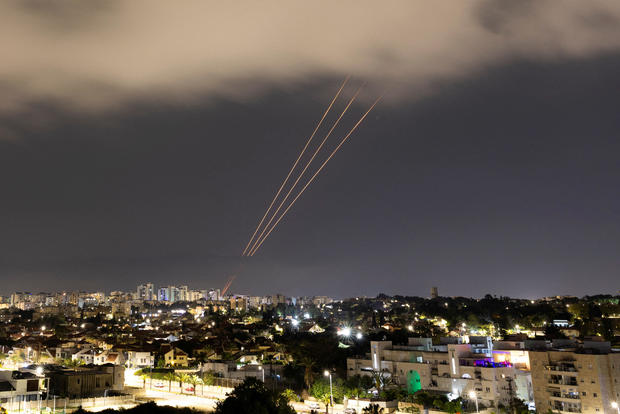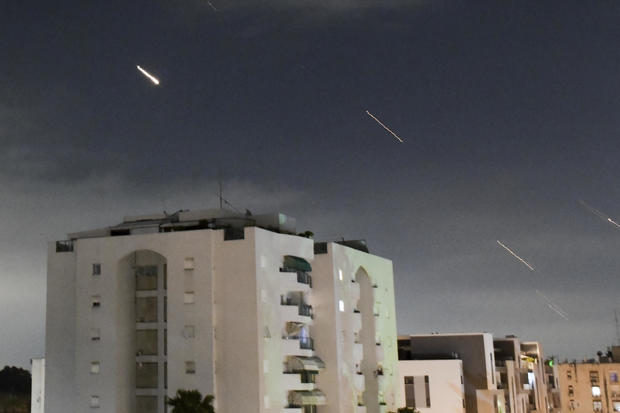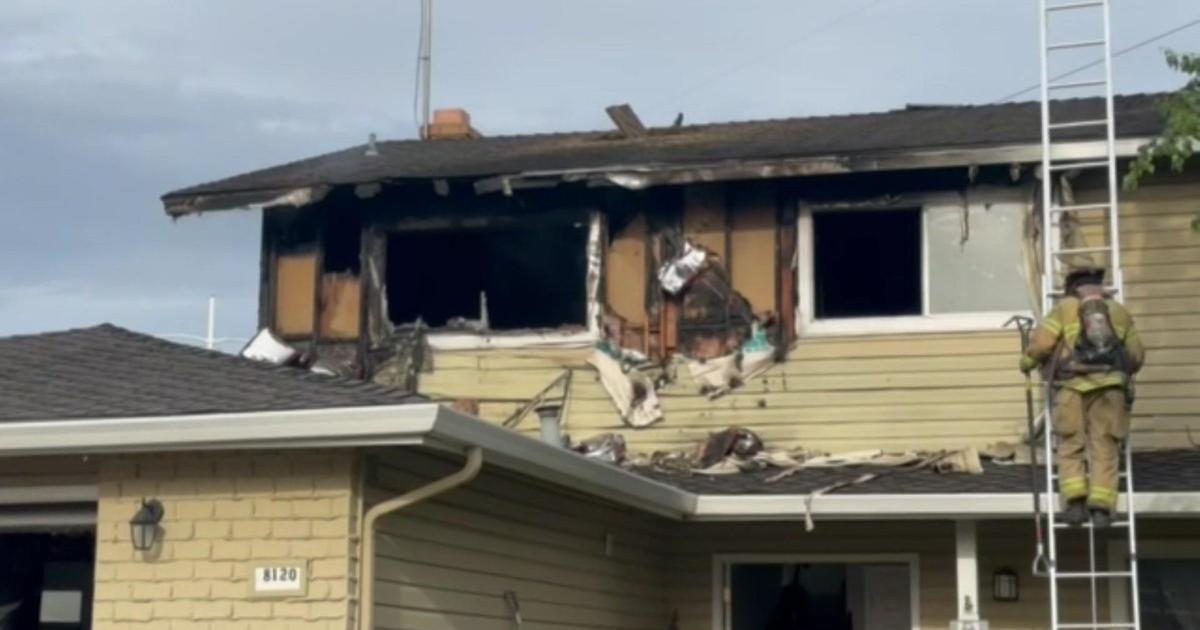Israel says Iran's missile and drone attack largely thwarted, with "very little damage" caused
Air raid sirens and loud booms sounded across Israel Saturday evening after Iran launched a barrage of missiles and drones at the country in a retaliatory attack, but Israeli officials said the assault was almost entirely thwarted by air defense systems and with the help of the U.S. and Israel's other allies.
More than 300 missiles and drones were fired from Iran toward Israel, Israel Defense Forces spokesperson Daniel Hagari said. He said virtually all of the weapons were intercepted before entering Israeli territory and he reported only minor damage to one military base from the few ballistic missiles that did land in the country. Hagari confirmed that a 10-year-old girl had been "severely injured by shrapnel," but said "as far as we know, there are no additional casualties."
"The Iranian threat met the aerial and technological superiority of the IDF, along with a strong fighting coalition — which together intercepted the overwhelming majority of the threats. 99% of the threats launched towards Israeli territory were intercepted — a very significant strategic achievement," Hagari said.
The IDF said in a separate, earlier statement posted on social media there were some injuries from the Iranian-launched missiles, including at a military base in southern Israel, but the full statement released later by Hagari made no mention of casualties.
"Very little damage was caused," Israeli Defense Minister Yoav Gallant said in a statement early Sunday, lauding his own forces and Israel's American and other international partners for having "thwarted this attack in an impressive manner."
Hagari said Iran launched about 170 drones, of which "zero crossed into Israeli territory." He said every one of the 30 cruise missiles fired by Iran also failed to reach Israeli territory, with 25 being intercepted by Israeli fighter jets.
"Out of over 120 ballistic missiles, only a few crossed into Israeli territory, with the rest being intercepted. These fell at the Nevatim Air Force Base, causing only minor damage to infrastructure," the IDF spokesperson said.
Two U.S. officials told CBS News that five ballistic missiles got through Israeli and U.S. air defenses and impacted Israeli territory. Four landed at Navatim Air Force Base, where Israeli F-35s are based and which U.S officials say was Iran's primary target. One missile hit a runway, another hit an empty hanger and a third hit a hangar that was no longer in use. Another ballistic missile appeared to be aimed at a radar site in northern Israel, but it missed.
Of the 120 ballistic missiles fired by Iran, roughly half failed on launch or crashed in flight, according to one of the U.S. officials.
The Iranian attack was designed to saturate Israeli and U.S. air defenses with drones and cruise missiles, clearing the way for the ballistic missiles. U.S. aircraft operating out of bases in Jordan and Saudi Arabia were waiting for the drones and shot down between 70 and 80 of them, with some aircraft shooting down more than one drone.
The United Nations Security Council held an emergency meeting at 4 p.m. ET Sunday convened at Israel's request, per a senior U.S. official.
In a statement released late Saturday night, President Biden condemned the Iranian assault — the Islamic republic's first-ever direct attack on Israel — and said the U.S. had "helped Israel take down nearly all of the incoming drones and missiles."
U.S. forces in the region "intercepted dozens of of missiles and UAVs en route to Israel, launched from Iran, Iraq, Syria and Yemen," Defense Secretary Lloyd Austin said separately.
The president disclosed that over the last week, U.S. forces had "moved aircraft and ballistic missile defense destroyers to the region" in anticipation of the attack.
Israel closed its airspace at midnight and fully activated its air defense systems ahead of the Iranian assault. It took several hours for the drones to reach Israeli airspace. Alerts began to sound across Israel at about 2 a.m. local time on Sunday (7 p.m. Eastern Saturday), the IDF said. Alarms went off in southern Israel, by the Dead Sea, in Jerusalem, and the Shomron area.
Iran's attack was the its promised retaliation for an April 1 strike by Israel on an Iranian consulate in Damascus, Syria, which killed seven officers from its Islamic Revolutionary Guard Corps.
In a statement, the IRGC said Iran had "launched a punitive strike against the occupied territories," referring to Israel. It acknowledged an operation involving "the use of both missiles and drones."
Iran's mission to the United Nations said on social media that the attack was in response to the strike in Syria and it added that, "the matter can be deemed concluded. However, should the Israeli regime make another mistake, Iran's response will be considerably more severe."
The mission added; "It is a conflict between Iran and the rogue Israeli regime, from which the U.S. MUST STAY AWAY!"
"Our response will be much larger than tonight's military action if Israel retaliates against Iran," the Islamic republic's chief of staff Maj. Gen. Mohammad Bagheri told Iranian state TV. He warned that if the U.S. were to back any Israeli retaliation for the overnight assault, it would lead to a targeting of U.S. bases in the region.
Mr. Biden returned to the White House on Saturday in anticipation of an imminent attack by Iran. Following a lengthy meeting with the National Security Council, he spoke by phone with Israeli Prime Minister Benjamin Netanyahu Saturday evening.
In his statement, Mr. Biden said he had reaffirmed to Netanyahu "America's ironclad commitment to the security of Israel," and told his Israeli counterpart "that Israel demonstrated a remarkable capacity to defend against and defeat even unprecedented attacks."
The president said he would convene a meeting Sunday with G7 leaders "to coordinate a united diplomatic response to Iran's brazen attack," and the U.N. Security Council was expected to convene on Sunday afternoon for an emergency meeting at Israel's request, a senior U.S. official told CBS News.
Michael Herzog, Israel's ambassador to the U.S., wrote on social media that Iran "must be held accountable" for Saturday's actions.
The U.S. was on standby for any further action by Iran or from within the region via its proxies, a U.S. official told CBS News. American military assets were positioned to be able to shoot down incoming drones from Iran, including with assets in Iraq and Syria, three U.S. officials told CBS News. The U.S. also has fighter jets on standby.
The U.S. Navy destroyer USS Carney remained in the central Mediterranean to provide additional protection if needed, while the destroyer USS Arleigh Burke was in the eastern Mediterranean.
The U.S. preference is for the Israeli government to wait and assess the impact of the Iranian reprisal before responding to it, a U.S. official told CBS News. The U.S. preference is for a calibrated response. The expectation was that the Israel would calibrate its response based on whether it successfully intercepted the incoming Iranian missiles and drones, and whether there were any casualties.
Netanyahu convened his war cabinet in Tel Aviv after delivering a video address Saturday night.
"In recent years, and even more so in recent weeks, Israel has been preparing for the possibility of a direct attack from Iran," he said. "Our defense systems are deployed, we are prepared for any scenario, both in defense and attack. The state of Israel is strong, the IDF is strong, the public is strong."
The British military scrambled jets from Cyprus in response to the Iranian assault, a U.K. official confirmed to CBS News. Britain's defense ministry later said in a statement that it had moved additional fighter jets and air refueling tankers to the region.
"These UK jets will intercept any airborne attacks within range of our existing missions, as required," the defense ministry said.
French military planes also contributed "in patrolling airspace" for Israel during the assault, IDF spokesperson Hagari said on Sunday.
Ahead of the attack, earlier Saturday, the Israel Home Front Command issued guidelines limiting all gatherings to a maximum of 1,000 people, and barring them altogether close to the border with Gaza. All schools were ordered to remain closed through at least Monday, including for day camps, though nearly all schools will be closed anyway over the coming week for the Passover holiday. People were advised to remain near safe rooms and shelters.
The U.S. government had also issued a shelter-in-place order for all employees and their family members in Israel, but it lifted that order Sunday morning, saying the "threat of drone and/or missile barrages has diminished."
Wider travel restrictions, limiting U.S. government staff and their families' travel around Israel, remained in place, and all Americans in the country were advised not to travel outside major cities, which are better protected from incoming fire by missile defenses.
On Friday, Mr. Biden urged Iran not to move forward with the retaliation it had promised for more than a week, saying his message to Tehran was: "Don't." Earlier in the week, the U.S. sent a senior general to Israel to coordinate with the close American ally on any response it might make to an Iranian attack.
British Prime Minister Rishi Sunak issued a statement condemning Iran's drone attack "in the strongest terms."
Josep Borrell, European Union foreign affairs chief, said in a social media post that the EU "strongly condemns the unacceptable Iranian attack against Israel, and calling it "an unprecedented escalation and a grave threat to regional security."
In a statement, China's foreign ministry urged restraint from all parties involved, calling the attack "the latest spillover of the Gaza conflict" and urging implementation of a recent United Nations Security Council resolution that demanded a cease-fire in the war, which it said "must end now."
Tension in the region has been rising sharply amid Israel's ongoing war in the Gaza Strip with Hamas, a close ally of Iran. Earlier on Saturday, Iranian commandos seized an Israeli-affiliated container ship near the Strait of Hormuz.
The U.S. government called on Iran to release the vessel and its international crew immediately.
"Seizing a civilian vessel without provocation is a blatant violation of international law," said National Security Council spokesperson Adrienne Watson. "It must be condemned unequivocally, and we will work with our partners to hold Iran to account for its actions."
All U.S. embassies in the Middle East were put on high alert and required to hold emergency action committee meetings. Diplomats in Lebanon and Israel were specifically told not to travel to certain areas within those countries.
Earlier in the day Lebanon launched missiles toward northern Israel. State media reported Jordan has closed its airspace "in light of the escalating risks in the region," and declared a state of emergency.
Sources Friday had told CBS News the retaliation could include attacks carried out both by Iranian forces and proxy groups around the region that Iran has been funneling additional arms to for weeks.
CBS News' Margaret Brennan, Eleanor Watson, David Martin and Debora Patta contributed to this report.








